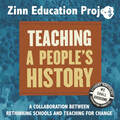Learning By Listening
Click Podcast image to access website

In August of 1619, a ship carrying more than 20 enslaved Africans arrived in the English colony of Virginia. America was not yet America, but this was the moment it began. No aspect of the country that would be formed here has been untouched by the 250 years of slavery that followed. On the 400th anniversary of this fateful moment, it is time to tell the story.
“1619” is a New York Times audio series hosted by Nikole Hannah-Jones. You can find more information about it at nytimes.com/1619podcast. |

What's CODE SWITCH? It's the fearless conversations about race that you've been waiting for! Hosted by journalists of color, our podcast tackles the subject of race head-on. We explore how it impacts every part of society — from politics and pop culture to history, sports and everything in between. This podcast makes ALL OF US part of the conversation — because we're all part of the story.
|
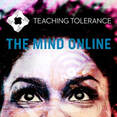
Exercise your ears and sharpen your brain with The Mind Online, hosted by Teaching Tolerance Managing Editor Monita Bell. Through conversations with teachers, librarians, scholars and reporters, Monita explores the critical aspects of digital literacy that shape how we create and consume content online. Discover what educators and students alike need to know—and how we can all become safer, better informed digital citizens.
|
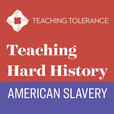
What we don’t know about American slavery hurts us all. From Teaching Tolerance and host Hasan Kwame Jeffries, Teaching Hard History brings us the lessons we should have learned in school through the voices of leading scholars and educators. It’s good advice for teachers, good information for everybody.
|
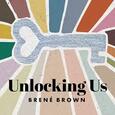
Unlocking Us with Brené Brown
Conversations that unlock the deeply human part of who we are, so that we can live, love, parent, and lead with more courage and heart.
Suggested episodes:
March 3, 2021: Brené with Dr. Yaba Blay on One Drop: Shifting the Lens on Race
January 27, 2021: Brené with Emmanuel Acho on Uncomfortable Conversations with a Black Man
November 11, 2020: Brené with Gabby Rivera on Superheroes, Storytelling and Joy as Resistance
September 30, 2020: Brené with Bishop Michael Curry on Love & Hope in Troubling Times
June 17, 2020: Brené with Laverne Cox on Transgender Representation, Advocacy + the Power of Love
June 10, 2020: Brené with Austin Channing Brown on I'm Still Here: Black Dignity in a World Made for Whiteness
June 3, 2020: Brené with Ibram X. Kendi on How to Be an Antiracist
April 7, 2020: Alicia Keys and Brené on “More Myself
March 23, 2020: Tarana Burke and Brené on Being Heard and Seen
Conversations that unlock the deeply human part of who we are, so that we can live, love, parent, and lead with more courage and heart.
Suggested episodes:
March 3, 2021: Brené with Dr. Yaba Blay on One Drop: Shifting the Lens on Race
January 27, 2021: Brené with Emmanuel Acho on Uncomfortable Conversations with a Black Man
November 11, 2020: Brené with Gabby Rivera on Superheroes, Storytelling and Joy as Resistance
September 30, 2020: Brené with Bishop Michael Curry on Love & Hope in Troubling Times
June 17, 2020: Brené with Laverne Cox on Transgender Representation, Advocacy + the Power of Love
June 10, 2020: Brené with Austin Channing Brown on I'm Still Here: Black Dignity in a World Made for Whiteness
June 3, 2020: Brené with Ibram X. Kendi on How to Be an Antiracist
April 7, 2020: Alicia Keys and Brené on “More Myself
March 23, 2020: Tarana Burke and Brené on Being Heard and Seen

Rothstein's new book, The Color of Law, examines the local, state and federal housing policies that mandated segregation. He notes that the Federal Housing Administration, which was established in 1934, furthered the segregation efforts by refusing to insure mortgages in and near African-American neighborhoods — a policy known as "redlining." At the same time, the FHA was subsidizing builders who were mass-producing entire subdivisions for whites — with the requirement that none of the homes be sold to African-Americans.
Rothstein says these decades-old housing policies have had a lasting effect on American society. "The segregation of our metropolitan areas today leads ... to stagnant inequality, because families are much less able to be upwardly mobile when they're living in segregated neighborhoods where opportunity is absent," he says. "If we want greater equality in this society, if we want a lowering of the hostility between police and young African-American men, we need to take steps to desegregate."
Rothstein says these decades-old housing policies have had a lasting effect on American society. "The segregation of our metropolitan areas today leads ... to stagnant inequality, because families are much less able to be upwardly mobile when they're living in segregated neighborhoods where opportunity is absent," he says. "If we want greater equality in this society, if we want a lowering of the hostility between police and young African-American men, we need to take steps to desegregate."

86% of teachers in the U.S. are white. Most of you listening to this episode are therefore white. Conversations about race are super prevalent right now and for many white people, and it feels like stepping onto a minefield.
They have literally no idea what to say, or feel like they don’t understand the history enough to contribute much to the conversation. Or, they say something they think is totally valid but inadvertently offend people of color in the discussion or get their own feelings hurt because they feel “attacked”, vowing to never, ever enter another conversation about race again. (Angela Watson’s Truth for Teachers)
They have literally no idea what to say, or feel like they don’t understand the history enough to contribute much to the conversation. Or, they say something they think is totally valid but inadvertently offend people of color in the discussion or get their own feelings hurt because they feel “attacked”, vowing to never, ever enter another conversation about race again. (Angela Watson’s Truth for Teachers)

Voices4Ed is an Education Post podcast where we bring in voices of students, parents, and teachers to talk about what’s really happening in our public schools. It’s a different conversation about public education.
Suggested Episodes: Episode 33: No Country For Black Men (feat. Dr. Kimberly Underwood & Dr. Eddie Moore Jr.) Episode 32: The Strength To Let Kids Struggle (feat. Dr. Sonja Santelises) Episode 29: The White Progressive’s Dilemma Episode 27: Is Your State Serving Black Students? (ft. EdTrust) |
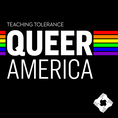
Without LGBTQ history, there is no American history. From Teaching Tolerance and hosts Leila Rupp and John D'Emilio, Queer America takes listeners on a journey that spans from Harlem to the Frontier West, revealing stories of LGBTQ life we should have learned in school.
This podcast is produced in partnership with University of Wisconsin Press, publishers of Understanding and Teaching U.S. Lesbian, Gay, Bisexual, and Transgender History. It is the first book designed for high school and university teachers who want to integrate LGBTQ history into their standard curriculum. From now until the end of the year, the University of Wisconsin Press is offering a 30 percent discount for Queer America listeners who order the recently updated, second edition of this collection. Use the promotional code, QAPODCAST. |
Deepening Your Understanding of Race and Racism
As educators, we have a deep responsibility to confront racial injustice, and ensure that we create anti-racist classroom environments. This includes our own ongoing reflection and learning. In this one hour event we will explore the role media plays in our collective understanding about race and racism, and how educators can use media to disrupt white supremacy and systemic oppression of Black people in America. This is a live event, so you will have the opportunity to ask our guests questions. Come prepared for a rich, deep, and honest conversation that will not only help you gain a deeper understanding of the roots of systemic racism, and how anti-Black racism impacts our daily lives, but also guide you as you reflect on your own role and responsibilities as an educator.
Using Media to Know Better, Teach Better | Tools for Anti-Racist Teaching
When conversations of racial injustice and equity arise, many educators find themselves reacting in the moment. In this one-hour webinar, a panel of experts discuss how teachers can analyze and evaluate media to provide important context for students and support anti-racist classroom planning and practices. Teachers can also find advice for using media literacy tools to empower students and inform their personal practice.
Focusing on Young Learners | Tools for Anti-Racist Teaching
In this webinar, we’ll discuss how and when to use media as a tool in anti-racist teaching for young learners. Learn ways to integrate media into classroom lessons, practice, or literature as a method of guiding students in developmentally appropriate, anti-racist learning.
Talking to Children Authentically about Race and Racism
This PBS KIDS for Parents-hosted conversation features fellow parents, educators, child development and trauma experts who join us to share tips and resources for how to talk with young children about racial injustice and violence against Black people. Explore questions such as: How can parents of Black children continue to instill confidence and pride in young kids while also explaining the racial inequity and barriers that continue today? And, how can parents of non-Black children help young kids understand their role in confronting anti-Black racism? Hear questions from fellow parents and learn tips and resources you can use to continue to have these meaningful conversations now and into the future.
Excerpt of the Frontline documentary, "A Class Divided" provided by ©1985 WGBH Educational Foundation. All Rights Reserved. A production of Yale University Films for FRONTLINE. Also available on PBS Learning Media.
Excerpt from “Mister Rogers’ Neighborhood” provided courtesy of The Fred Rogers Company.
For additional resources, visit the Talking to Young Children About Race and Racism collection on the PBS KIDS for Parents website: Talking To Young Children About Race and Racism
Thursday, March 11, 2021 @ 4:00 pm - 5:00 pm EST Thursday, March 18, 2021 @ 4:00 pm - 5:00 pm EST Tuesday, March 30, 2021 @ 1:00 pm - 2:00 pm EST Wednesday, March 24, 2021 @ 4:00 pm - 5:00 pm EST |
Embracing Anti-Bias Classrooms: A Response to Racism in America Wednesday, July 8, 2020 @ 2:00 pm - 3:00 pm EDT (Live Webinar is full but you can register to get the recording)
You may attend the National Educator Anti-Racism Conference online. Click the link above to see the list of events. They are mostly free (some are donation based) and are happening between August 8th and August 13th.
- National Educator Anti-Racism Conference: Early Childhood & Anti-Racism (Sat, 8/8/2020 12:00 PM – 1:30 PM EDT)
- National Educator Anti-Racism Conference: Elementary Ed. & Anti-Racism (Wed, 8/12/2020 2:00 PM – 3:30 PM EDT)
- Anti-Racism Conference: School & District Leadership & Anti-Racism (Wed, 8/12/2020 5:00 PM – 6:30 PM EDT)
- National Educator Anti-Racism Conference: Keynote Roundtable (Thu, 8/13/2020 4:30 PM – 5:30 PM EDT)
More Than Hope
‘More Than Hope’ is part of holding regular conversations about racial justice. We are setting aside time for these conversations, to hear ourselves, and to hear from others.
More Than Hope 2.0 with Afa Dworkin, Regina Carter and Leyla McCalla 1/12/21
More Than Hope in Sound and Words 8/21/20
Broadcasting live this September and October, our four-part webinar series Let’s Talk! will cover a range of critical topics that can be difficult to discuss with students and colleagues. The first webinar will explore Black Lives Matter, an activist group that media, schools and communities often struggle to understand. You’ll learn about the roots of Black Lives Matter, its platform and its connections to past social justice movements. You’ll also gain tools for engaging students about the Black Lives Matter movement in the classroom.
Earn credit: When you complete 95 percent or more of the webinar, a certificate of completion will be available for you to download and print from within the webinar platform. Since Teaching Tolerance is not a credit-granting agency, we encourage you to check with your administration to determine if your participation will count toward continuing education requirements.
Teaching Tolerance webinars offer helpful guidance and great ideas from our experienced teaching and learning specialists and from innovative educators in the Teaching Tolerance community. Watch these FREE on-demand webinars at your own pace and share them with colleagues!
The Color of Law
Indigenous Peoples' History
Teaching Asian American and Pacific Islander Heritage
Latinx History Is Black History
Teaching Hard History in Grades K-5
What Is White Privilege, Really?
LGBTQ Best Practices: Classroom Culture and Curriculum
Fun Social Justice Activities for Elementary Students
Speak Up at School
Let's Talk! Discussing Race, Racism and Other Difficult Topics With Students
Let's Talk! Discussing Whiteness
The Beloved Community Talks (BCT) mission is to create an environment conducive to open, honest, and unapologetic conversations that are civil; bringing people out of their comfort zone to promote understanding and to influence equitable change to the national infrastructure.
We envision that individuals and communities will find commonalities that bring them together in order to work on initiatives in their respective communities. The BCT will provide an environment within communities where people can get to know each other, seeking first to understand and then to be understood.
Visit the website to access more.
February 19th, 2021: Examining the Evidence: Supporting Immigrant-Origin Students and English-Learners
Immigrant-origin children and English-learners are among the fastest growing school-age populations in the U.S. As two distinctly different groups of students with overlapping challenges, both immigrant-origin students and English-learners (ELs) often must navigate limited access to at-home educational resources while being disproportionately affected by COVID-19. Many students have seen their access to direct language instruction decrease in this time as a result of districts’ competing priorities, and students and their families have trouble navigating resources when they aren’t available in their native language.
Given these challenges, what can the research evidence tell us about the practices districts, schools and teachers can use to build inclusive learning environments that support immigrant-origin and EL students’ educational success and build inclusive learning environments and reduce the widening opportunity and achievement gaps between this group of students and their peers?
Join us for a lively discussion moderated by Education Week’s Debbie Viadero, assistant managing editor. The panel will draw on the evidence from two new EdResearch for Recovery briefs, “Supports for Students in Immigrant Families,” and “Supports for Students Who Are English-Learners.”
February 9th, 2021: The 4 Biggest Challenges of MTSS During Remote Learning: How Districts Are Adapting
As districts forge ahead with supporting learners virtually during the COVID-19 public health crisis, common challenges and themes are emerging—from adapting interventions for delivery online, to gaining visibility into students’ holistic needs, to providing equity of support for every student. Hear MTSS, accountability, and counseling leaders share their journey in overcoming the biggest obstacles of adapting a multi-tiered systems of supports (MTSS) or response to intervention (RTI) framework in a hybrid or remote learning environment.
This webinar will cover how to:
Modify existing universal and targeted interventions for virtual use |
JULY 21, 2020 @1:00PM ET: A Time to Amplify the Student Voice: Strategies for Teaching and Empowering Young Minds to Create Sustainable Change
Access the presentation slide deck
A collection of free and premium virtual broadcasts, including upcoming and on-demand webinars. Browse our premium webinars here. All webinars are accessible for a limited time after the original live streaming date.
July 23rd, 2020: Teachers on the Frontlines: Dismantling White Supremacy from Within the Classroom
Are our schools actually failing? Or are they working just as they were designed to?
Despite reforms, despite funds from well-meaning donors, our schools routinely underserve Black students. It doesn’t matter what you name it (the achievement gap, the opportunity gap, the education debt), Black students end up at the bottom of every measure of academic success.
It’s time to name the elephant in the room.
SCHOOLS WERE DESIGNED TO MAINTAIN WHITE SUPREMACY CULTURE.
Schools are not just institutions of knowledge, they are institutions of indoctrination. But this challenge is also an opportunity.
What if schools raised a new generation of change agents who are equipped to dismantle white supremacist institutions? What if classrooms led students towards liberation for themselves and their communities?
Teachers, stand on the frontlines of the fight for racial equity. You are uniquely positioned to change our future. You were made for these times.
TEACHERS ON THE FRONTLINES is a free webinar for educators who are ready to transform their classrooms into spaces of liberation.
Hosted by Pitt’s Office of Diversity and Inclusion, the Diversity Forum 2020, titled Advancing Social Justice: A Call to Action is a first-of-its kind virtual event at Pitt that’s free and open to the public. It will be held July 28-30. The forum will spark conversations among people across disciplines and with diverse life experiences to suggest ways to dismantle systemic racism in our communities. To take part and receive access to the virtual sessions, complete this registration form.
August 3rd: Teach Like... A Human (this is not a free training)
Join Joe Truss, founder of Culturally Responsive Leadership, and the Washington Post bestselling authors of Hacking School Discipline, Brad Weinstein and Nathan Maynard, as they take a deep dive into how racial bias influences relationships and restorative practices. This training will be especially impactful for groups looking to change practices at their schools and districts.
Topics will include:
-How racism and bias can be a barrier to restorative practices
-How to get started with staff
-How to facilitate conversations about race in classrooms
-Restorative practices basics
-What to do before facilitating restorative practices
-How to build strong and true rapport
-How to facilitate conversations to seek-to-understand driving behaviors
-How to utilize circle work for tough conversations with staff and student
PREPARING TEACHERS FOR ANTI-RACIST TEACHING: TRANSFORMING TEACHER PREPARATION PROGRAMS
August 7th | 4-6pm PST (7-9pm EST)
August 7th | 4-6pm PST (7-9pm EST)
Anti-racist struggle and pedagogies have a long and important history in the US. For over 40 years, the field of research on anti-racist teaching has developed but with little impact on the systematic preparation of teachers, public school curricula, and classroom practices. This panel brings together experts to dialogue on the following questions: How do we best prepare teachers for anti-racist teaching? What does the present moment teach us about where teacher preparation programs need to go?
Empowering Educators: A Convening on Racial Equity in Education
August 19, 2020 | 11 a.m. - 3 p.m. EST
August 19, 2020 | 11 a.m. - 3 p.m. EST
The AU Antiracist Research and Policy Center is proud to partner with First Book and Pizza Hut to present Empowering Educators: A Convening on Racial Equity in Education. Featuring National Ambassador for Young People’s Literature Jason Reynolds, as well as award-winning educator Liz Kleinrock, and AU scholars, this event will support K-12 educators in engaging in effective, courageous conversations about race and social justice.
Agenda
Welcome | 11AM
Session One | Practical and Actionable Guidance for Educators | 11:15AM
Keynote | Teaching Humanity with Jason Reynolds | 12:30PM
Session Two | The Importance of Antiracist Teaching | 1:30PM
Closing Remarks | 2:45PM
Teaching For Black Lives During the Rebellion
Friday, August 21 at 11am PT, 1pm CT, 2pm ET
Friday, August 21 at 11am PT, 1pm CT, 2pm ET
Join Teaching for Black Lives co-editors Dyan Watson, Jesse Hagopian, and Wayne Au for an urgent discussion on teaching and organizing for racial and economic justice in our schools during the rebellion.
Dyan Watson is a former high school teacher and teacher educator. Currently, she serves as the Director for Inclusion at the Oregon Episcopal School and is a Rethinking Schools editor. Some of her works include: Teaching for Black Lives,Rhythm and Resistance: Teaching Poetry for Social Justice, and Rethinking Elementary Education.
Jesse Hagopian teaches Ethnic Studies and is the co-adviser to the Black Student Union at Garfield High School in Seattle. He is a Rethinking Schools editor, the co-editor of Teaching for Black Lives, the co-editor of the forthcoming book, Black Lives Matter at School, and editor of More Than a Score: The New Uprising Against High-Stakes Testing.
Wayne Au is a professor in the School of Educational Studies at the University of Washington Bothell. He is a long-time Rethinking Schools editor, editor of Rethinking Multicultural Education, co-editor of Teaching for Black Lives, and author of A Marxist Education: Learning to Change the World.
Cierra Kaler-Jones is the Education Anew Fellow at Teaching for Change and Communities for Just Schools Fund. She is a Ph.D. candidate in the Department of Teaching and Learning, Policy, and Leadership at the University of Maryland, College Park. Her work examines how Black girls use arts-based practices as forms of expression, resistance, and identity development.
This event is hosted by Rethinking Schools and sponsored by Teaching for Change.
Participants will need access to Zoom.
The VT-HEC has secured a block of 75 participant slots for this event, hosted and facilitated by our colleague,
Paul Gorski, in conjunction with the Equity Literacy Institute.
In this 4-part series, racial justice educators share key philosophical, practical, pedagogical, and theoretical insights about how to teach racial justice in PK-12 schools. We will explore what it means to engage youth of various ages in critical conversations that transcend "celebrating diversity"; how to cope with resistance from colleagues, parents, and others; where to find powerful resources; what it means to approach teaching for racial justice in "age appropriate" ways; and how to make sure we're teaching racial justice in the most transformative, pedagogically sound ways.
The United States has a racism problem. The idea of tackling such complicated and hurtful topics in our homes and classrooms is daunting, but we can’t look away. We MUST face it. Fortunately, we live in a time when technology provides resources, such as the anti-racism videos below, designed to support us as we navigate these difficult and painful conversations. |
PRECIOUS KNOWLEDGE illustrates what motivates Tucson High School students and teachers to form the front line of an epic civil rights battle. While 48 percent of Mexican American students currently drop out of high school, Tucson High's Mexican American Studies Program has become a national model of educational success, with 93 percent of enrolled students graduating from high school and 85 percent going on to attend college. However, Arizona lawmakers are shutting the program down because they believe the students are being indoctrinated with dangerous ideology and embracing destructive ethnic chauvinism. |
Dim the lights and get ready to learn with these TT-approved films! |
Through the stories of a retired New York City cop, an eccentric Orange County realtor, and an aspiring real estate developer in Baltimore, Owned explores the promise of US housing policies, the systematic oppression in many of America’s “chocolate cities,” and the communities that these systems have created. The film suggests that ultimately, these communities have more in common than they might expect. |
An Outrage, a film by Hannah Ayers and Lance Warren, is available for streaming only, exclusively for registered Teaching Tolerance members. |
Black lives matter. Learn more about racial injustice and the Black experience in America with this collection of films, series and documentaries. (Netflix, 2020) |

